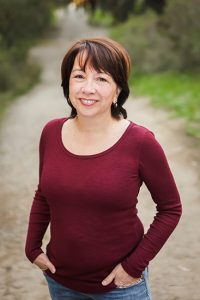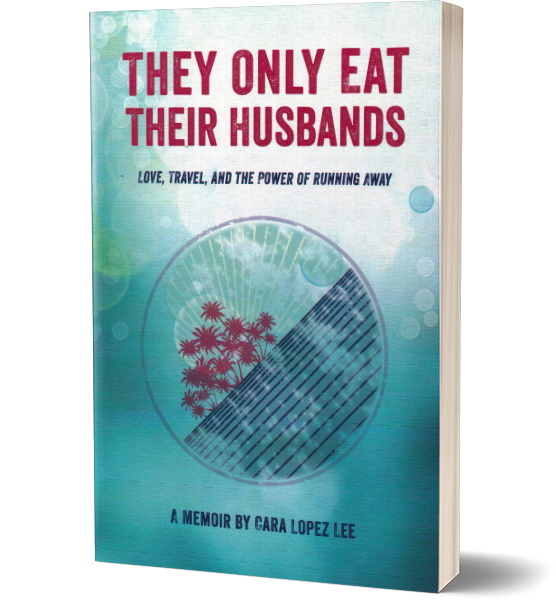Although the recession has cut into my humble income, it still pays to speak the language of adventure. During the past two years I’ve been doing research for a historical novel based on my Mexican-Chinese grandma, called Tortillas from the Chung King Café. I’ve explored parts of South China, El Paso and Los Angeles most travelers don’t bother with. As I wait to afford my next trip, I’m cutting back on videos and caffeine to help pay for lessons in Spanish and Chinese.
Researching genealogy is like becoming a detective. There’s no murder mystery – I hope – but plenty of secrets, and some belong to the dead. As a traveler, having a personal goal has immersed me in unexpected aspects of foreign cultures. Last year I traveled to Taishan County, China to seek clues to my family’s past. With the help of a translator, I stumbled on a 99-year-old cousin who met my great-grandfather, and his Mexican wife and children, back in the 1920’s.
Overseas Cousins: Ma Wen Hui & Cara Lopez Lee
My cousin, Old Mr. Ma, lives in the village of Jian, near my great-grandfather’s tiny childhood home and the big house his family later built. In El Paso, my great-grandpa was Ben Mar, a Chinese restaurant owner, but in Jian, he was Ma Bing Sum, the richest man in town. Since Jian is a Ma village, and I’m a descendent, Old Mr. Ma and his granddaughters declared, “You are family!” and invited me to return. I plan to go back in 2010. But I’m not waiting to begin that next adventure; with every Mandarin word I learn, I’m already on my way back to Zhon Guo – which means “Middle Country,” what we call China.
Learning a language exposes me to new people and new ideas, before I leave home. So far, three Chinese teachers have opened three windows into their culture. Vicki called recently, and when I called back the next day, she said, “Why you not call me back yesterday?” I was taken aback, until I remembered this was just friendly Chinese directness. On the other hand, I once asked Vicki how to say “It’s a beautiful day,” and she said, “A Chinese person would not say this. Chinese people keep more inside.” She explained, “I think it’s because if we have something good and we say it, the luck might go out.” Her words reminded me to take care when learning another culture: just when I think I understand something, I probably don’t.
It’s easy to experience culture shock anywhere, even at home. Consider my Buddhist friend Amy. She decided to check out a Denver area temple she’d passed many times, in hopes of renewing her meditation practice. Imagine the surprise of my blond, blue-eyed, English-speaking friend, when she walked into an all-Chinese service! The members smiled and welcomed her, so she stayed, though she didn’t understand a word. She silently followed the motions of the others: sitting, standing and bowing. She felt awkward, but kept a detached sense of humor, a helpful skill for any adventurer. My new teacher has suggested that as I learn more she’ll invite me to an all-Chinese gathering, so I can practice my new language… and my detached sense of humor.
I’m taking Spanish, too. This might sound like too much, but I already speak basic Spanish, so it’s not that hard. Allow me a rationalization: my novel is about my Mexican-Chinese grandma, who spent her young life in El Paso and East LA, so my research has taken me to those places, too.
El Paso might sound dull and dusty. On the contrary. OK, it is dusty – but my search for family history has given me the excuse to visit strange corners, and to corner strangers. I’ve interviewed people with ties to El Paso’s small Mexican-Chinese community. Carmen Stearns’ great-grandfather, Shan Yon Kee, was the first Chinese man in town to marry a Mexican woman, Guadalupe Gemente, in 1887. “It was a very deep secret,” Carmen said. When Carmen’s Latino father heard she was researching her Chinese heritage, he said, “‘No one in this family is doing any kind of research, because it’s not true.’” But Carmen has the wedding certificate to back the family skeleton.
Carmen gave me a tour of downtown, where historic buildings tell a coming of age tale about the Old West. We stepped inside the Camino Real, where hotel guests once sat on the roof and watched the Mexican Revolution across the river, back when my great-grandpa first moved to this railroad town in the 1910’s. I touched the warm brick of the vanished Stanton Hotel, where my grandma used to live across the alley from her father’s Chung King Café, where she waited tables in the 1940’s. I toured the glamorous Plaza Theatre, where my father used to look up at the twinkling stars of the auditorium’s faux night sky and dream, back in the 1950’s. Nearby, the two live alligators Dad remembers from Alligator Park now stand memorialized in fiberglass.
Family interviews bring my detective story to life, until even a walk through East LA becomes an adventure. No, not the kind where I might get shot; it’s safe by day. I’ve stood inside the department store of Grand-Mom’s sepia-toned memories: “Back when I used to work at The First Street Store.” Today a haphazard collection of second-rate merchandise, it was once a herald of modernity. I’ve walked the main drag, where Dad once cruised the sidewalks with friends who used Spanglish phrases like “Ay te watcho!” (“See ya later!”) At a nearby stand, I bought a raspada. That’s just a Mexican snow cone, yet as I slurped my strawberry-flavored ice, it tasted like adventure, and like home – as a girl I lived not far from here.
Spanish lessons carry me into that neighborhood and others with more confidence. Maybe I’ll ask a question or overhear something that will fill in a piece of my puzzle, the torn bits of culture that make up me – Mexican, Chinese, Irish, English, Swiss, French and Cherokee. The Spanish language also takes me to cultures that aren’t mine: I recall Peru, Costa Rica and Spain, and wonder where I’ll practice conversación next.
When I backpacked through Europe, I made the most friends in Spain because I knew a little Spanish. I didn’t speak fluently, but well enough to understand when a man from Ronda said, “Cada persona as un mundo.” “Each person is a world.” If so, then we all have within us the tools for adventure, and we can all embark on an expedition into the next person we meet.





